News
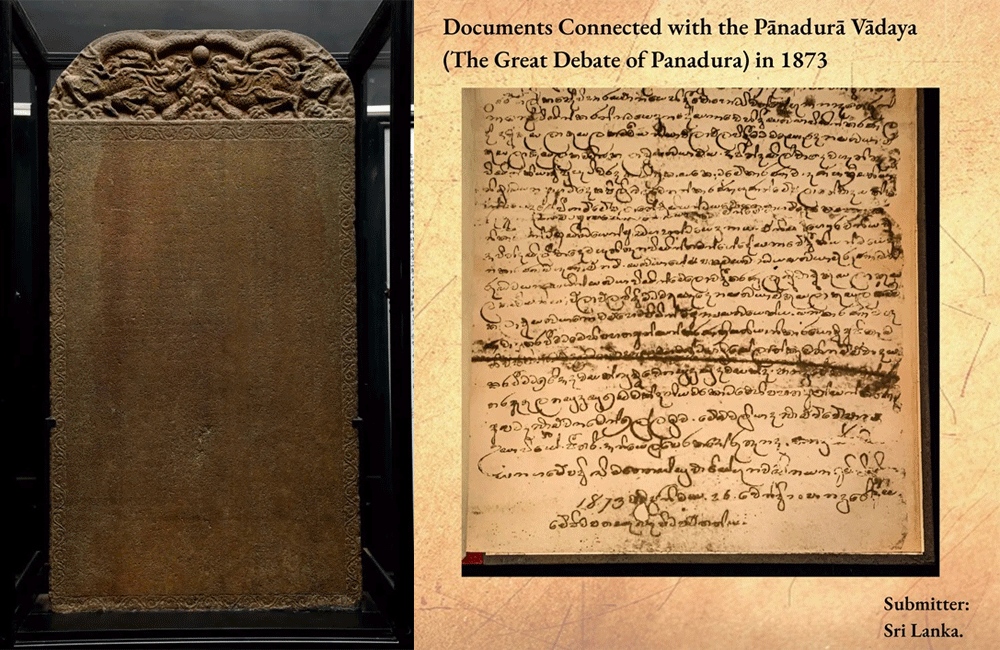
Sri Lankan documents in UNESCO’s Memory of the World Register
Several documents linked to Sri Lanka have been inscribed on UNESCO’s Memory of the World Register.
The register consists of documentary collections including books, manuscripts, maps, photographs, sound or video recordings, which bear witness to the shared heritage of humanity.
Collections are added to the register by decision of UNESCO’s Executive Board, following the evaluation of nominations by an independent international advisory committee.
According to UNESCO, the following documents have been added to its Memory of the World Register.
Trilingual Inscription (TribhashaSellipiya)
Submitters: China and Sri Lanka.
The Trilingual Inscription is a stone tablet with Chinese, Persian and Tamil inscriptions, praising Buddha, God Vishnu and Allah. Discovered in 1911 in Sri Lanka by a British engineer, it is now preserved in the Colombo National Museum, with a replica exhibited in the Galle National Museum. Dated 15th February 1409, the tablet was installed by the Chinese Admiral Zheng He. Originally inscribed in the Treasure Boat Shipyard Park in Nanjingin, it was brought to Sri Lanka during his third voyage. The text mentions offerings made to a sacred mountain shrine. This is the only trilingual inscription having texts in Chinese, Tamil and Persian, which represent three different regions and cultures.
Documents Connected with the Pānadurā Vādaya (The Great Debate of Panadura) in 1873
Submitter: Sri Lanka.
The four documents, kept at the Rankot Viharaya Buddhist temple in Panadura, hold immense historical, cultural, spiritual, and intellectual value. Created against the backdrop of religious discord between Buddhists and Christians in the mid-19th century, they consist of correspondence between the Christian and Buddhist leaders advocating for an open dialogue on doctrinal issues, as well as a transcription of the entire dialogue. This transcription spans 27 and a half pages of handwritten text on paper using ink. The event fostered reconciliation and mutual respect between the two religious communities. The English translations, later made available in Europe and the US, had a significant impact on religious activists and scholars in those countries, contributing to the recognition of Buddhism as an advanced religion.
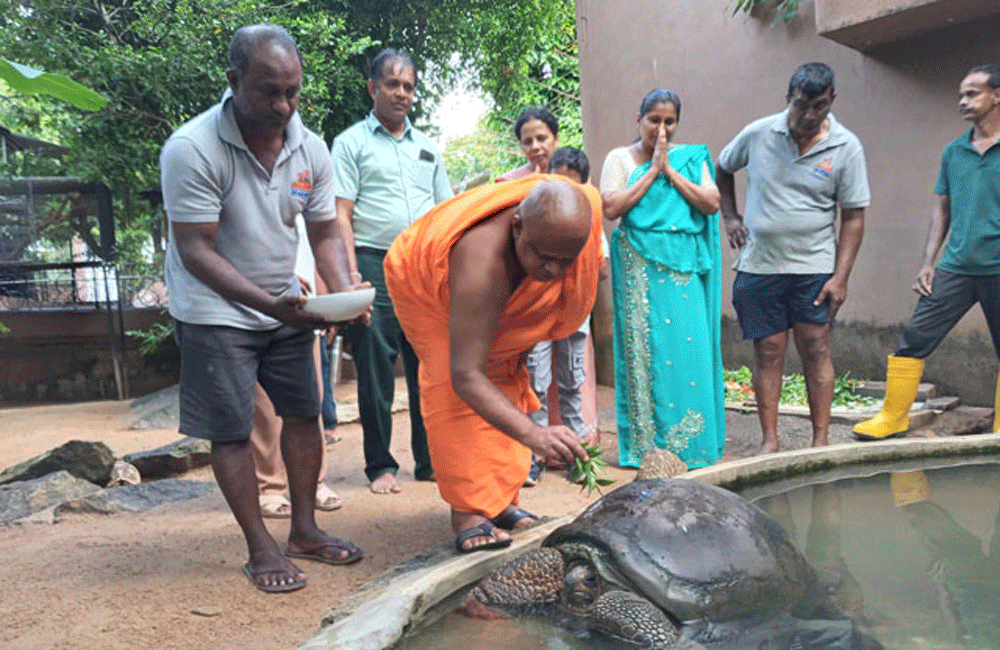
153-Year-Old Tortoise Anointed Oil at Dehiwala Zoo
The Dehiwala National Zoological Gardens hosted a special oil anointing ceremony, marking a significant cultural tradition.
Among the participants was Sri Lanka's oldest living animal, a 153-year-old giant tortoise, who stole the spotlight with its presence.
The ceremony, held amidst the lush greenery of the zoo, attracted many visitors.
The giant tortoise, revered for its longevity and symbolic representation of wisdom and resilience, was gently anointed with oil, following the traditional practices that aim to bless and protect the animals.
The Sinhala and Tamil New Year, celebrated in April, is one of the most significant cultural events in Sri Lanka. Among the various traditions observed during this festive period, the oil anointing ceremony holds a special place.
The oil anointing ceremony, known as "Hisa Thel Gaema," is performed to invoke blessings of good health and prosperity for the coming year.
This ritual typically takes place at an auspicious time, which is determined by astrologers.
his ritual is often led by religious leaders and is accompanied by the chanting of blessings.
The oil anointing ceremony is not just a religious practice but also a communal event that brings families and communities together.
The ceremony is widely observed across the country, with notable events held at historic temples and cultural sites.
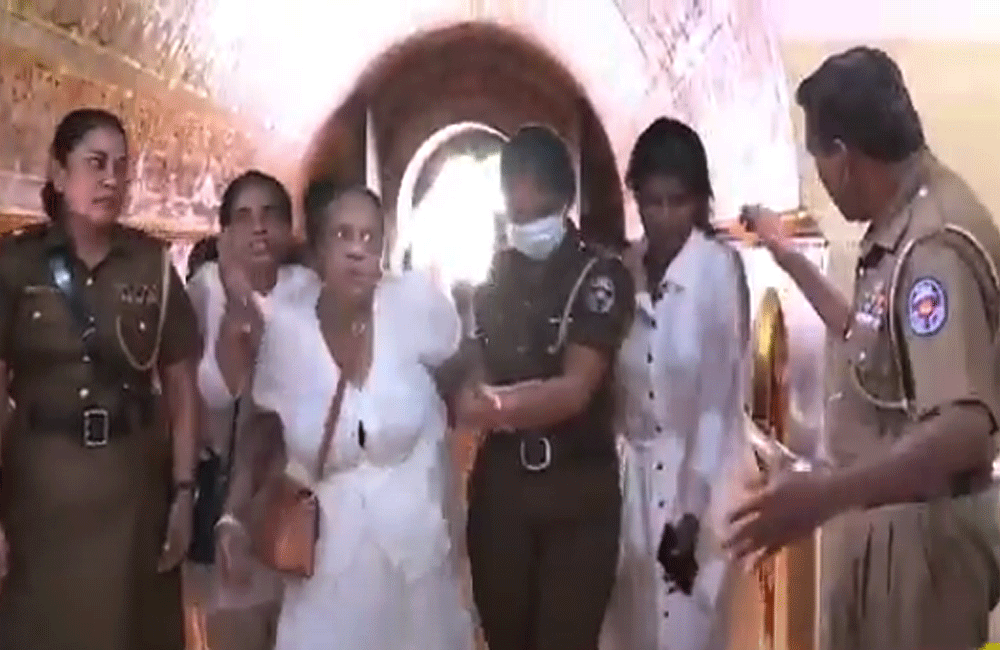
Special allowance for police officers on duty during ‘Siri Dalada Vandanawa’
Sri Lanka Police Headquarters has taken steps to provide special travel expenses and a composite allowance to police officers on duty for the “Siri Dalada Vandanawa”, the special exposition of the Sacred Tooth Relic.
Police have implemented a special security and traffic plan to ensure the safety of local and foreign devotees attending the “Siri Dalada Vandanawa” at the Temple of the Tooth Relic in Kandy, which is being held for the first time in 16 years, from today (18) until April 27.
The Acting IGP has instructed that all police officers participating in this operation be provided with special travel expenses and a composite allowance.
The Police Headquarters has made this decision in recognition of the additional expenses incurred by officers due to performing day and night duties away from their regular workplaces for more than 10 days.

Kandy Schools Close for Relic Exposition
Due to the Siri Dalada Relic Exposition, 37 schools within the Kandy city limits will be closed from April 21st to 25th, as announced by the Central Province Education Department.
The Siri Dalada Relic Exposition, scheduled to take place from April 18th to 28th, is a significant cultural event that draws large crowds, necessitating these measures.
In addition to the school closures, three new access routes have been introduced by the Dalada Maligawa or the Temple of The Sacred Tooth Relic to facilitate the movement of devotees:
-
From D.S. Senanayake Street to the Dalada Maligawa's main entrance.
-
From Ratubokkuwa through the Kandy Lake roundabout (Sangharaja Mawatha) to the main entrance.
-
From Ratubokkuwa through the Kandy Lake roundabout (Maligawa area) to the main entrance.
To accommodate the influx of visitors, the Sri Lanka Transport Board has announced the deployment of 150 additional buses from various regions across the country.
Furthermore, Sri Lanka Railways has planned special train services from Colombo and other areas to Kandy during this period.

Ravi K’s Bill to repeal Online Safety Act gazetted
The bill to repeal the Online Safety Act, No. 9 of 2024, has been gazetted.
The gazette notification states that upon the passage of this bill, the Online Safety Act, No. 9 of 2024, will be repealed.
The gazette notification further states that if there are any regulations related to this, all such regulations will also be repealed.
The gazette notification notes that in the event of any inconsistency between the Sinhala and Tamil language texts of this Act, the Sinhala language text shall prevail.
The Bill that has been gazetted was submitted by opposition MP Ravi Karunanayake.
The Online Safety Bill was passed by a majority vote in Parliament on 24 January 2024.
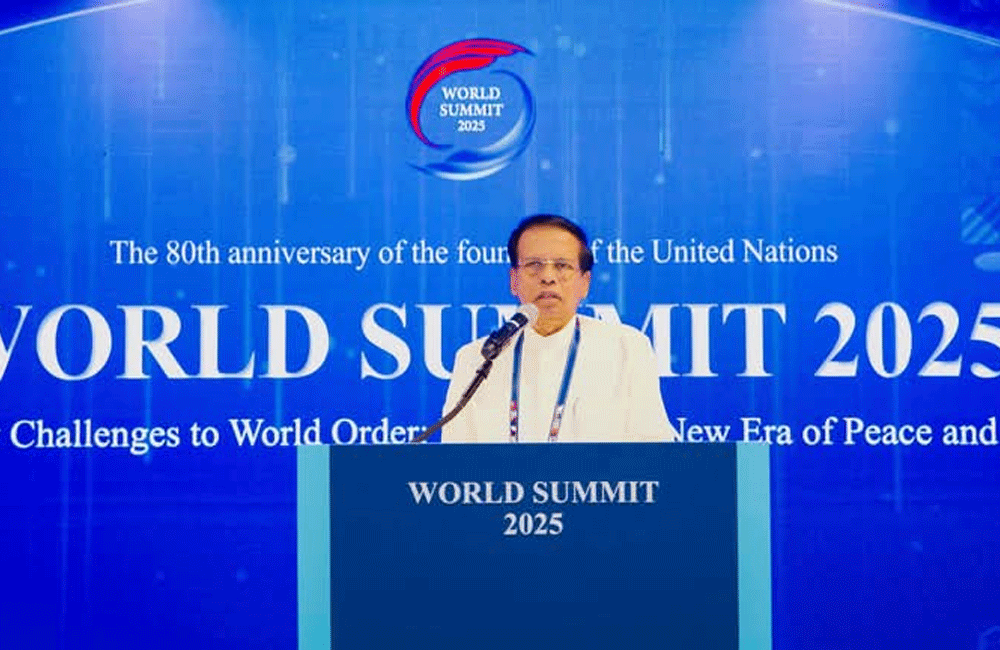
Maithripala attends 2025 World Summit of the Universal Peace Federation
Former President Maithripala Sirisena attended the 2025 World Summit of the Universal Peace Federation in South Korea, from 10-14 April, as a Chief Guest.
Maithripala Sirisena, the Asia-Pacific Regional Chair of the International Peace Summit Council of the World Peace Conference, delivered a special address at the inaugural session of the Global Summit.
During his address, Maithripala Sirisena emphasised the need to build a bicameral global organisation that integrates religion and politics to maintain global political stability and peace, manage climate change, and manage conflicts.
The 2025 Global Summit was attended by former heads of state, current speakers, current members of parliament, and other diplomats, scholars, and professionals from about 40 countries.
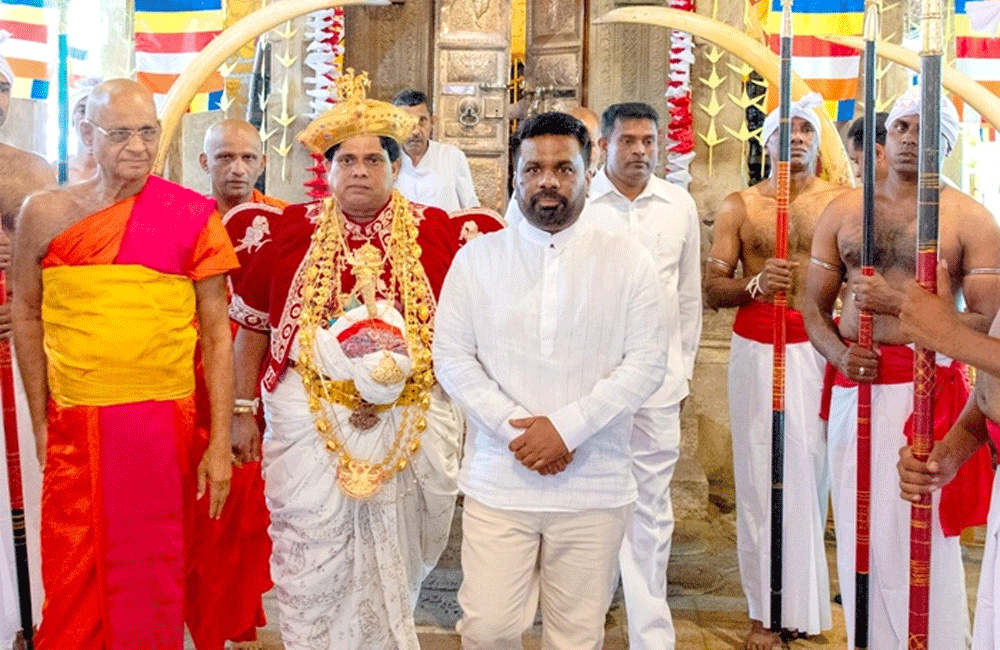
President inaugurates ‘Siri Dalada Vandanawa’
The ‘Siri Dalada Vandanawa’, a special exposition of the Sacred Tooth Relic in Kandy, was inaugurated by President Anura Kumara Dissanayake today, after a period of 16 years.
Following the inauguration, the President paid homage to the Sacred Tooth Relic of Lord Buddha, after which it was opened to the public.
Several foreign diplomats, including Ambassadors and High Commissioners, were also present on the occasion.
At the request of the President, the ‘Siri Dalada Vandanawa’ was organised under the guidance of the Chief Prelates of the Malwathu and Asgiri Chapters, and under the direction of the Diyawadana Nilame of the historic Temple of the Sacred Tooth Relic in Kandy.
The special exposition of the Sacred Tooth Relic will continue for 10 days, from today until 27 April.
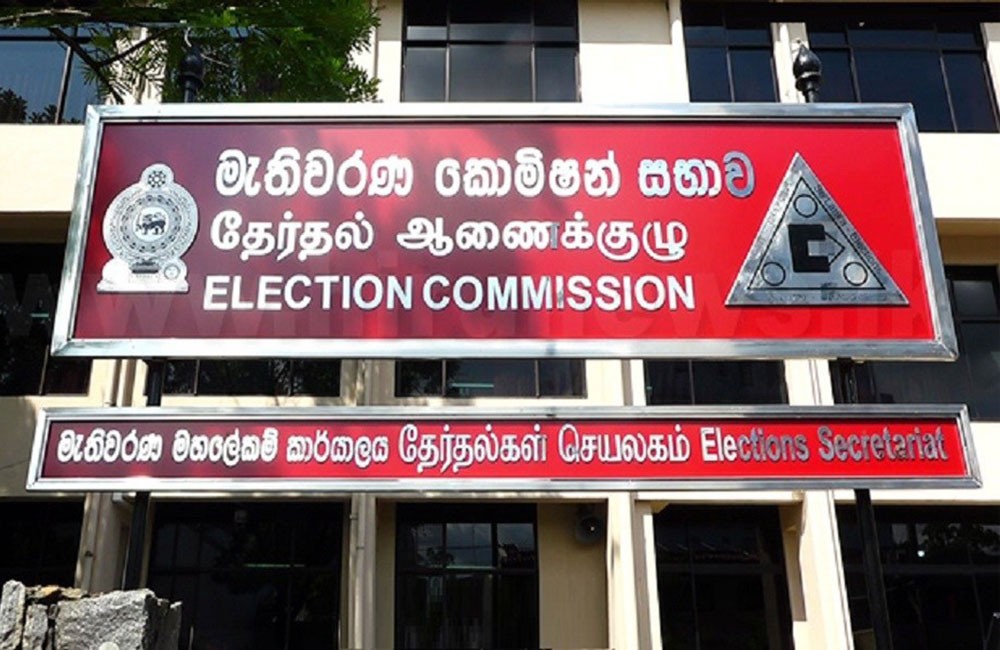
Postal voting delayed in 18 local govt bodies, including CMC
The National Election Commission states that postal voting in 18 local government bodies, including the Colombo Municipal Council, will be delayed.
This delay is due to the postponement of printing of postal ballot papers, following an interim injunction that prevented the local government elections scheduled for May 6th, in these local government bodies.
Chairman of the National Election Commission R.M.A.L. Rathnayake stated that they are currently studying the court rulings and taking steps to inform the Government Printer.
However, postal ballot papers for 227 local government bodies have already been distributed.
Postal voting for the upcoming local government elections is scheduled for the 22nd, 23rd, and 24th of this month.
Voters who are unable to cast their votes on those dates can do so on April 28th and 29th.
The Court of Appeal issued an interim injunction on the 7th of April, suspending the election proceedings in 18 local government bodies, including the Colombo Municipal Council.
This was in response to writ petitions filed by several political parties and independent groups against the rejection of their nominations.
However, on the 11th of this month, the Court of Appeal ordered the removal of this interim injunction.
This order was issued after ordering the re-acceptance of the rejected nomination papers submitted for those local government bodies.
The Court of Appeal issued this order after considering a motion filed by the Attorney General.
(News 1st)

Gujarat Titans Pick Dasun Shanaka as Replacement for Injured Phillips
Gujarat Titans (GT) have brought in Sri Lanka allrounder Dasun Shanaka as a replacement for the injured Glenn Phillips for the remainder of IPL 2025.
Shanaka has played for GT in the past, in 2023, and comes in for INR 75 lakh (USD 87,800 approx.).
Phillips had picked up a groin injury while fielding against Sunrisers Hyderabad (SRH) in Hyderabad just over ten days ago, and was later ruled out of the tournament to head back home, to New Zealand.
Shanaka has played only one season of the IPL so far, when he got three games for GT, scored only 26 runs and didn't get to bowl at all two seasons ago.
GT had earlier lost the services of Kagiso Rabada, on April 3, when he left home for "an important personal matter". There is no clarity on when, and if, he will return to India. GT hadn't named a replacement for Rabada.
GT have won four of their six games and are on second spot on the points table with nearly half of the league stage over. Their next match is the afternoon game on Saturday, at home against table-toppers Delhi Capitals (DC).
Source: ESPN cricinfo
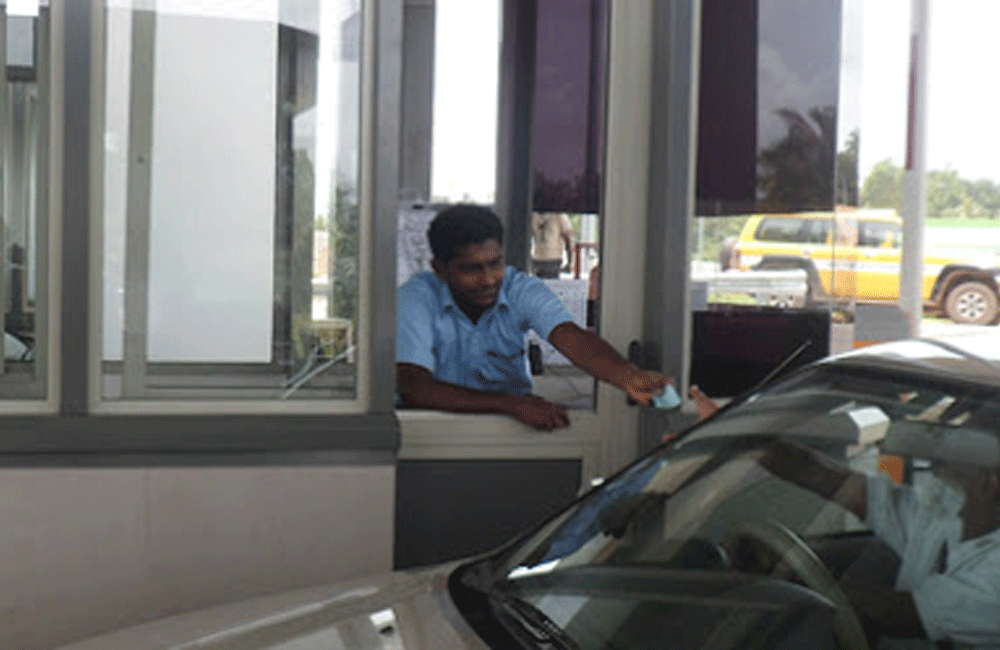
RDA revenue from expressway tolls up by 30%
The revenue generated by the Road Development Authority (RDA) through expressway tolls on 11, 12 and 13 April has increased by 30% in comparison to the income generated during the same period last year.
A total of 387,586 vehicles had used the expressways on 11, 12 and 13 April, according to the Director of Expressway Operation Maintenance and Management Division, R.A.D. Kahatapitiya.
Accordingly, the RDA has generated an income of Rs. 134,498,800.
Kahatapitiya added 163,541 vehicles used the expressways on 11 April, and the RDA generated an income of Rs. 54,066,450, while on 12 April, 134,195 vehicles used the expressways, and their income was Rs. 47,012,350.
Furthermore, 89,850 vehicles have entered expressways on April 13, which has generated an income of Rs. 32,120,000 for the RDA.

LG Elections 2025: Postal Voting Dates Revised
The Election Commission says that dates for marking postal votes for the upcoming Local Government Elections scheduled for May 6, 2025 have been revised.
Chairman of the Election Commission R. M. A. L. Ratnayake said that postal voting will now take place on April 24, 25, 28, and 29.
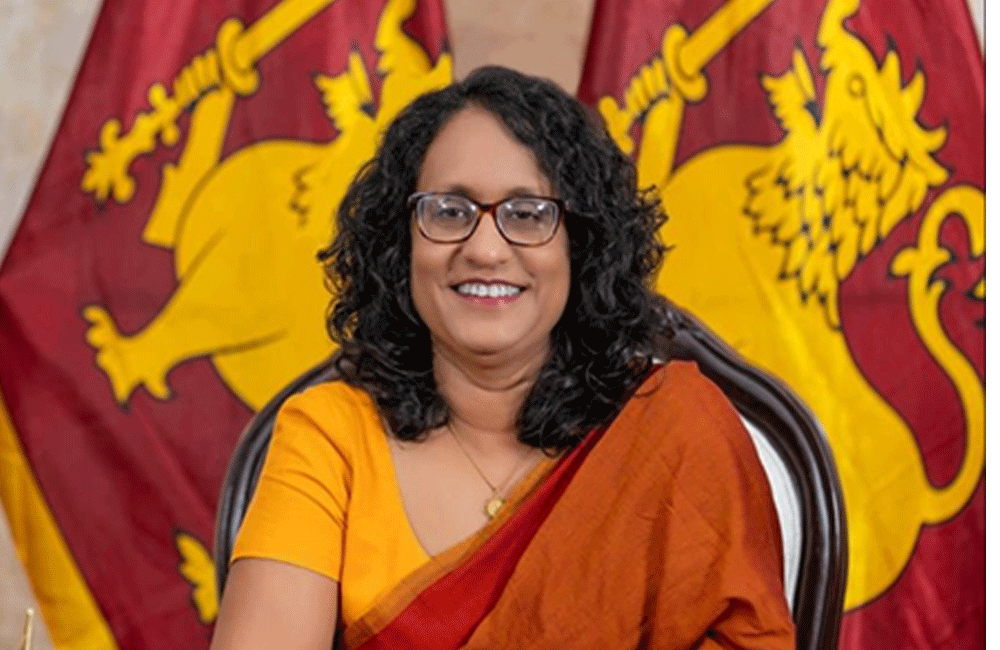
Sinhala & Tamil New year : PM’s message
Let us step into the New Year with renewed hope and a vision, as we continue to work together toward “a prosperous country and a beautiful life.”
I extend my heartfelt wishes to the Sinhala and Tamil people of Sri Lanka, who celebrate the New Year in unity and generosity.
This New Year dawns at a moment when a new change is essential in every aspect of our lives. This traditional festivity reminds us to bring about positive change that is deep rooted in our culture and values, and move forward together in unity.
In recent years, the economic crisis made even the thought of celebrating the New Year a painful experience for many. However, the courageous efforts of the people to break free from a cycle of corruption and fraud, has led the path for the emergence of a new beginning.
Thus, the 2025 New Year marks a significant turning point. It is a year where communities from the North, South, East, and West unite and continue to work together under democratic principles to build a better future. In the upcoming month of May, the people’s aspirations will once again bear fruit.
At this moment when a new chapter begins with the New Year, I urge every citizen to act with respect, peace, and compassion in community. Let us commit ourselves to move forward with dedication, trust, and resilience to achieve success and progress in the coming year.
To all Sri Lankans celebrating Sinhala and Tamil New Year, I wish the nation is blessed with the strength, unity, and new energy needed for meaningful transformation and a prosperous tomorrow.
Wishing you all a very Happy New Year!
Dr. Harini Amarasuriya
Prime Minister
Democratic Socialist Republic
of Sri Lanka
Page 130 of 658